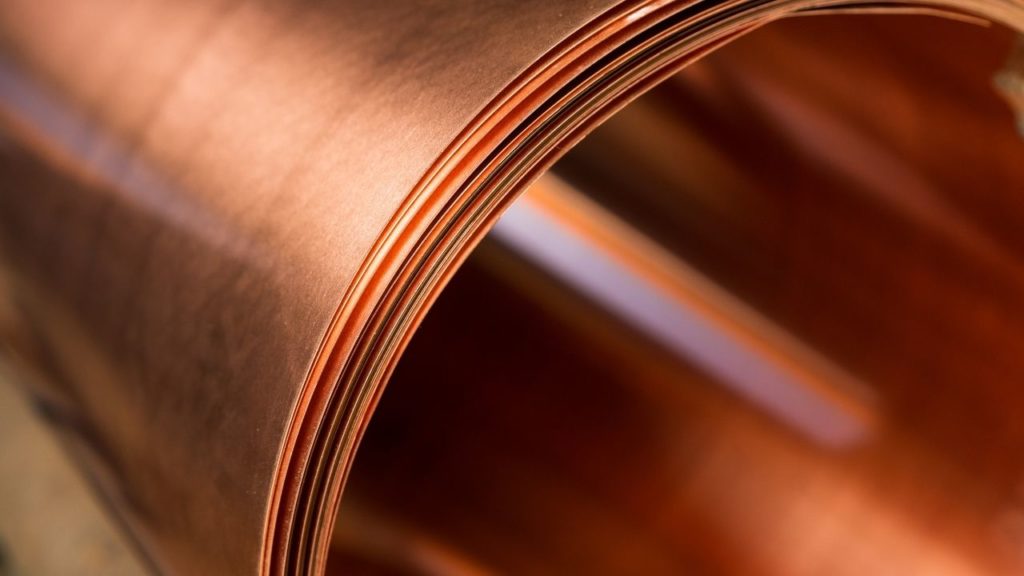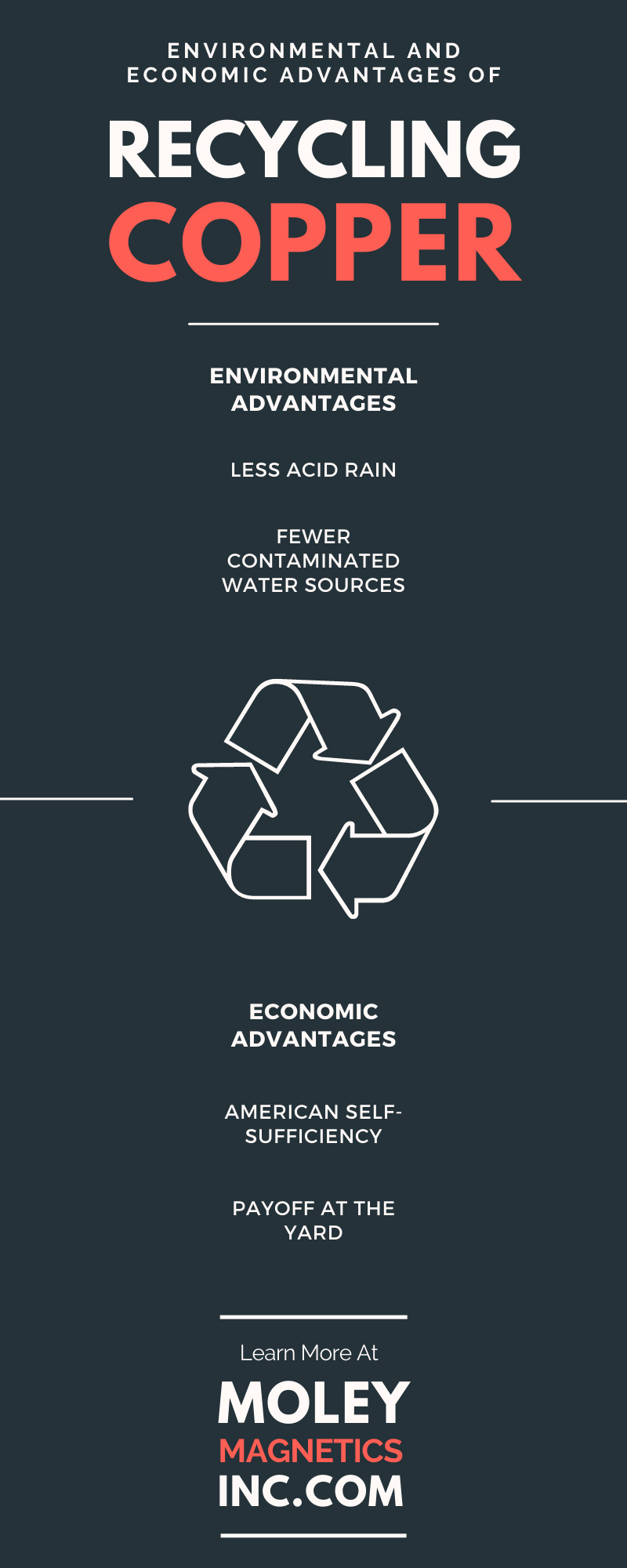
Environmental and Economic Advantages of Recycling Copper
You don’t need to be an archaeologist to recognize that copper, #29 on the periodic table, has been #1 in our hearts. Humans have been harnessing this metal for over 10,000 years, with the same element in primitive pendants appearing in modern-day broadband infrastructure. From the Bronze Age to the Internet Age, the properties of copper have made daily life possible. What would happen if obtaining this metal were no longer possible? The thought is almost too much to bear.
Fortunately, copper is perhaps the most eminently recyclable metal in existence, as well as one that we can melt down and reform almost infinitely. The same copper that ran through the plumbing pipes of ancient Egypt may very well be within the copper fixtures of your own home. This is more than a fun fact—it’s a necessity. We need to make the most of copper’s recyclability for financial and ecological reasons alike. Today, we’ll examine both the environmental and economic advantages of recycling copper.
Environmental Advantages
Copper marries form and function well among the non-ferrous metals. The copper that we use and see in everyday life often has a radiant reddish-brown luster. Sometimes, exposure to the elements gives it an aesthetically pleasing patina of mint green—the iconic hue of the Statue of Liberty. Nevertheless, the copper that we mine from the earth isn’t quite as attractive without significant refinement, and those refining processes take their toll on the environment. Let’s look at a few of those processes and what kind of harm they can do to our earth.
Less Acid Rain
Miners don’t encounter copper in its elemental form. Rather, we find copper ores that combine with other elements to form more complex minerals. The most common ores are copper sulfides, which combine copper with sulfur. Removing that sulfur to procure the valuable metal within requires chemical processes that leave behind toxic byproducts. One of these, sulfur dioxide, is extremely hazardous to our atmosphere. It combines with water to form sulfuric acid, a major component in acid rain. This compound is highly destructive to living things and man-made structures alike, shifting sensitive pH levels for aquatic lifeforms and accelerating corrosion. Recycling existing copper rather than having to refine it from ores reduces the levels of sulfur that enter our atmosphere and water cycle, thus diminishing acid rain and the damage it does.
Fewer Contaminated Water Sources
Even before ore leaves the mine, contamination of groundwater begins as a result of copper mining. Even in minerally rich areas, copper sulfide ore accounts for very little of the material. Miners take what they want but leave the rest in waste pits, where exposure to oxygen and water degrades these lesser sulfide ores, causing them to leach sulfur back into the ground.
A Case Study: the Berkeley Pit
You can see the damage that mining virgin copper does for yourself. We’re not kidding—an instance of copper-sulfide extraction has become one of Montana’s leading tourist attractions. The Berkeley Pit, located just northwest of the city of Butte, is the rare Superfund site with a visitors’ center. Nearly 30 years of open-pit mining allowed nearby aquifers to begin filling the man-made pit. However, at the same time, the exposed sulfides reacted with oxygen and the newfound water, yielding a toxic soup with a pH around 2.5—consider that water’s pH should be a perfectly neutral 7. The pit’s caustic contents kill waterfowl who don’t know to avoid it, and it was only with dire and drastic intervention that we were able to prevent the pit from potentially contaminating Montana drinking water. If you have a chance to visit the Berkeley Pit, the deleterious nature of copper mining lies in plain sight. See for yourself the coppery water’s characteristically unearthly green tinge. The importance of reducing mineral extraction should loom large as you exit through the gift shop.
Economic Advantages
If the environmental damage associated with mining virgin copper still doesn’t resonate with you, let’s try talking dollars and cents instead. Keeping copper in circulation is good for business, whether that’s your own business or America’s. The environmental and economic advantages of recycling copper are both important. Here are a few examples of how recycling copper pays off in terms you can count.
American Self-Sufficiency
The transformation of the American economy into a purely service-based one is an exaggeration, and the position of the United States as a leading copper producer and exporter puts the lie to accusations that ours is a nation that has forgotten how to make anything. The United States stands as the fourth-largest producer of copper in the world, with roughly 8 percent of the world’s copper production. To be sure, we owe much of this to production to active mines, but we also owe just as much to the recycling and reuse of existing resources. According to the Copper Development Association, a trade association of the industry, 72 percent of annual non-wire copper production relies on recycled material. If we can inch that number even higher, we can put American copper production into an enviable position. The U.S. can be not only self-sufficient in its copper production, needing no virgin copper from other nations, but would also be able to export even more to the global marketplace. Chants of “We’re #1”? It’s something to aim for.
Payoff at the Yard
Talking about the American economy is thinking big. Let’s think smaller. When it comes to recycling metals, steel doesn’t pay off. You need to think in terms of tons, not pounds, to even start considering a solid return on investment. Copper, on the other hand, is one of the most valuable non-ferrous metals that recyclers can obtain. Scrappers may have to pay civilians a pretty penny—pun intended—for consumer copper scrap such as wiring, fixtures, and computer components, but they’ll come out ahead when they sell their haul for meltdown or melt it down themselves. If you want to get copper ready for resale in-house, start with a scrap copper wire granulator machine from Moley Magnetics. Wiring is one of the most common applications of copper, and being able to prepare it for the next step in production will help you generate revenue from this very important metal.


